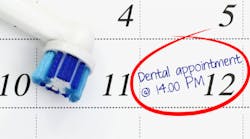Dental recall visits are never ‘just a cleaning’
When I ask dentists and their teams what the most important business system is in their dental practices, their top five answers are (1) patient cancellations, (2) new patients, (3) scheduling, (4) insurance, and (5) collections.
Where is recall/recare and continuing care in the list of important systems? (These are the same and I will refer to them as recall.) Is it overlooked and orphaned to become out of sight, out of mind? Recall should be number one on the list. Here’s why: the value of this system is paramount to the survival of the dental practice. Practice management experts and hygiene professionals estimate that anywhere from 40% to 85% of clinical production comes directly from hygiene or recall appointments.
Is the front office team informed?
Most dental staff members are not aware of this, nor are they consistently coached on the skills to manage patients’ needs for long range treatment planning. Having patients return for their routine maintenance visits is commonly thought to be just for patients’ oral health stability. That’s why this important appointment is often called “just a cleaning.” It is so much more than that. It is so important to have a professionally-trained staff person who acts as a liaison between the patients and the practice.
As a veteran in dental management, it amazes me that most recall systems are missing a designated person who’s accountable for a standard operating system from which to draw direction and goals.
Who is caring for recare?
When I ask dental office managers, “What is your system for recall?” this is what I usually hear:
• We use Lighthouse (or Demandforce, Revenue Well, or other patient reminder system). (This is great, but it’s not the “silver bullet.”)
• We send out postcards or text and email reminders.
• We wait for patients to call us.
• We call patients when we have downtime.
This is the extent of their “systems"?
Then I ask, “What do you say when you call?” The variety of answers I hear usually amount to, “We say, ‘Hi, Mrs. Brown, I’m calling you because you’re overdue for your appointment. I have an opening tomorrow at 10 a.m. Can you take it?’”
My next question is, “Out of 20 calls, how many appointments do you schedule?”The number one answer is, “We don’t usually reach patients, we leave voicemails. But if we do reach patients, we usually schedule one to five appointments.”
That’s one to five more appointments than the office had before! Calling works! The roadblock is that calling is done on downtime and not presented in a way that makes the patient feel urgency for scheduling. The calls are also made when patients are not available to answer.
Helping patients recognize value
Bringing value to the hygiene appointment is often left up to the front office staff. During a call, how should the staff respond when the patient says, “I’m doing fine. I can wait a while longer. The hygienist said my homecare is great”?Without clinical notes to discuss another reason to schedule, the caller is at the whim of the patient’s excuse to delay the appointment.
Research should be completed before a call is made. What is the date of the last hygiene appointment? What do the clinical notes say? Is insurance a factor, and is the patient eligible with benefits available? Is the patient due for radiographs that are “evidence based”?
Does the patient need an extended time scheduled for evaluations or to address a concern? Does the patient have a balance forward on his or her account from a previous visit?
If the hygienist or dentist would make a note about why the patient should return for recall in addition to the “cleaning,” this would bring value to the appointment and help the front office staff book the appointment. For instance, let’s say Mrs. Brown has been doing better with home care and is about to be released to schedule her next six-month appointment. The hygienist makes a clinical note to “evaluate #28 MOD composite filling because of cracks and washing out of existing restoration and #31 ML 4 mm pocket that was bleeding and had exudate.”
When the front office calls the patient, they can explain that this is more than a “cleaning.” The need to evaluate potential issues is also included in this important appointment.
Proper handling of the system
Does your office have a team member who is accountable for the recall system (in their job description)? Has this accountable person been trained to be able to communicate effectively with patients?
Is unscheduled time tracked? It is important to analyze production lost by too many open time slots. This indicates that value is not brought to appointments. Does the number of hygiene hours available match the number of appointments necessary for patients?
What can you do to ensure this system is being cared for in your office? Employees cannot do what they have not been taught to do. There should be a written system that includes a job description and outlines training for the position. In today’s dental offices, most systems are managed by a dental software program, which is only as accurate as the data entered. If you do not indicate which of your patients need more frequent periodontal attention, the system defaults to six-month recalls. If you intend to use your dental software efficiently, everyone should to be trained, not just the front office personnel.
People are busy and most do not keep up with their recall due dates. It would be a perfect world if they did and there wouldn’t be a need for a system to track and appoint them at all. It is very important for dental practices to never neglect their recall system and never consider this system to be “just a cleaning.”
For the most current office manager headlines, click here.
For the most current dental headlines, click here.
About the Author

Belle DuCharme, RDA, CDPMA
Belle DuCharme, RDA, CDPMA, has been a dedicated writer, speaker, and consultant for the dental profession for many years. With a solid foundation in practice management and clinical experience, DuCharme has helped hundreds of dental clients achieve success. Her journey began as a dental assistant and that is where her passion was ignited. Her mission is to help other dental professionals succeed in creating happiness and prosperity. You can reach Belle at [email protected].

